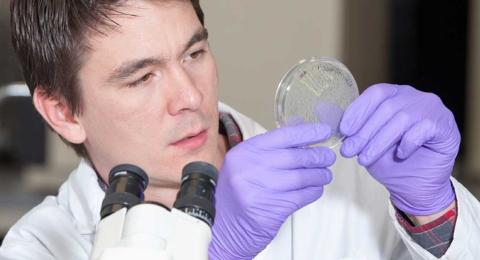What is biotechnology?
Biotechnology is one of the newest and fastest-growing scientific fields. Exploring topics like biochemistry, molecular biology and genetics, biotechnology seeks to apply biological processes to technologies that can help improve our lives and planet. This cutting-edge field is changing the world in a variety of ways, from reducing the spread of infectious disease through genetics to cutting greenhouse gas emissions with biofuels.
Why study biotechnology at UNH Manchester?
The biotechnology minor introduces students to the field of biotechnology in a five-course sequence that explores bioethics and the central content areas of biology and biotechnology, with a focus on modern genetics and laboratory techniques. Through skills-based training in state-of-the-art labs, biotechnology minors add a valuable credential to their major that indicates a substantial additional skill set in the laboratory-focused and forward-looking field of biotechnology.
Potential careers
- Biochemistry
- Biomedical research and development
- Manufacturing
- Medicine
- Microbiology
- Pharmacy
- Quality assurance/regulatory affairs
- Quality control
- Sales and technical support
- Veterinary practice
Curriculum & Requirements
The Minor in Biotechnology will introduce students to the field of biotechnology in a five-course sequence that will provide substantial education and training in bioethics, as well as the central content areas of biology and biotechnology, with a focus on modern genetics and laboratory techniques. Students adding the biotechnology minor will be adding a valuable credential to their major, indicating a substantial additional skill set in the laboratory-focused and forward-looking field of biotechnology.
To ensure a course counts toward the minor, it is required that students consult the minor coordinator, before enrolling in the course.
Students must complete five courses (20-21 credits, depending on the courses chosen). The minimum acceptable grade in these courses is a C-, and the average grade for these courses must be a C or better. Transfer course approval for the minor is limited to, at most, two relevant courses successfully completed at another accredited institution, subject to syllabi review and approval. Courses for non-majors will not count towards the minor.
| Code | Title | Credits |
|---|---|---|
| Required Courses | ||
| BIOT 501 | Ethical Issues in Biology | 4 |
| GEN 604 | Principles of Genetics 1, 3 | 4 |
| Biotechnology lab techniques course 1, 2 | 4-5 | |
| Select one of the following: | 8 | |
BIOL 411 & BIOL 412 | Introductory Biology: Molecular and Cellular and Introductory Biology: Evolution, Biodiversity and Ecology | |
or BIOL 413 & BIOL 414 | Principles of Biology I and Principles of Biology II | |
| Total Credits | 20-21 | |
- 1
Biotechnology majors-level course.
- 2
BMS 503 General Microbiology/BMS 504 General Microbiology Laboratory may be an additional pre-requisite course.
- 3
Students in majors with 3+ course overlap (e.g., Neuropsychology) will need a different course than GEN 604 Principles of Genetics within the Biotechnology major. BMS 503 General Microbiology/BMS 504 General Microbiology Laboratory is a recommended alternative.

